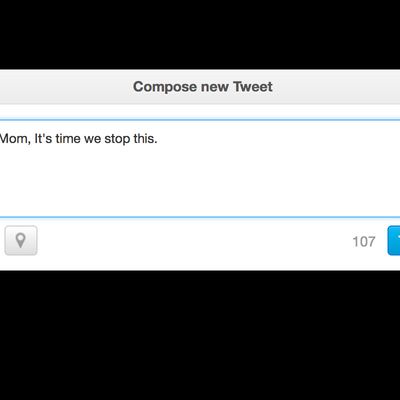
When I mention that my mom and I blocked each other on Twitter, the first thing people usually say is, “Your mom’s on Twitter?”
It’s a fair question. When it comes to social media, most moms seem content to roost in the cozy henhouse of Facebook. Few of my Gen-X colleagues who work in media have had to interact with their own mothers in snarky, hashtagged, often inane missives. But one day two years ago, my mom announced she was signing up for Twitter. So — in a show of support we would both later come to regret — I became her very first follower, and she followed me back.
Our real-world relationship has always been close. We live a few blocks from one another and get together frequently. We talk about family history, possible plot twists on Homeland, and how to make my son do more chores. In real life, across the dinner table, we make each other laugh all the time.
Things got uncomfortable fast, though. My mom didn’t join Twitter as a passive reader — she sought it out as an anonymous refuge from her job in publishing, where she felt unable to freely express her conservative politics. And she got really, really good at it. Opinionated and articulate, she took well to an environment that favors the quick-witted. She soon picked up the techniques of a veteran tweeter: getting into protracted conversations with active tweeters, sending provocative messages to pundits and blowhards. When she retired last year, I asked her what she was planning to do all day, and she said, “Enjoy myself, exercise, tweet.” She’d whip out her iPhone during dinner to compose tweets that had struck her while we were eating. She’d tell me about her activity — she’d gotten her 500th follower, this or that person had retweeted her, etc. The last time I checked, she had 786 followers.
We’d long ago come to terms with our different opinions on politics and decided to look beyond them. We might not see eye to eye about taxes or social programs, but she has a Ph.D. and a thorough knowledge of current events. She comes to her opinions well informed. In fact, our debates made us realize we could love each other without sharing our beliefs — even get along really well, as long we didn’t judge each other for our politics.
But upon entering the personal megaphone of Twitter, that selective tuning-out became impossible. However incomplete a portrait, following someone on Twitter feels a lot like peeking into her brain. That works nicely when you handpick the crowd you feel like “conversing” with, but when you have an intimate relationship with some one you follow, the disconnect between what they tweet and how they act IRL can be jarring. Neither my mom nor I are life-streaming, overtweeters who share every little thought. She went to that medium to find like-minded conservatives, so she tweeted most about the types of issues that we purposely avoided talking about in real life. I went to find news to write about and to laugh about things. The only reason I would have followed some one who tweeted the things my mom tweeted was if I had to for work reasons, and even then, it would probably be a “hate follow.” I did not want to be reminded that she thought about the Constitution a lot, or that she was displeased with our president. She in turn found my talking about royal weddings and live-tweeting of awards shows unbearably stupid (I’ll give her that one). Because I know her as a compassionate, open-minded person, and she knows that I actually would prefer to read at night than to watch TV, our online personae seemed too much at odds with our actual selves.
She blocked me first, though I didn’t notice right away.
“You’re not tweeting much,” I said one evening.
“Actually, I blocked you,” she replied.
She explained that she didn’t feel free to “truly speak her mind” while she knew that I was following her. She worried that I judged her for her politics, and said she wanted to be able to “be herself” online. The accusation stung. I loved her no matter what she believed! It took very little time to realize that she was right, of course. We were much happier not knowing what the other was tweeting.
Recently, my very religious uncle joined Twitter. I know this because I tweeted something with the word God (and an expletive), and he replied, “You shouldn’t take the Lord’s name in vain.”
This time I knew just what to do. “Unfollow me now,” I texted him, “You’re not going to like me on twitter.” Then I blocked him.
*Names have been changed




